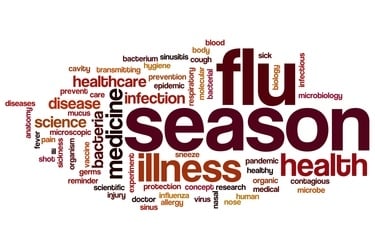People in South Louisiana get excited about several seasons - football, basketball, and baseball to name three. Hunters are excited about deer and dove season. The holiday season, coming to a close, brought with it lots of excitement, too.
There is one other season that people don't get excited about - flu season. However, with the proper precautions, flu season does not have to be cause for too much concern.
Here are seven key facts about flu season that you need to know.
1. What is the flu (also called influenza)?
According to the Centers for Disease Control (CDC), the flu is a "contagious respiratory illness caused by influenza viruses that infect the nose, throat, and lungs. It can cause mild to severe illness, and at times can lead to death."
2. How long is flu season?
Flu activity most commonly peaks in the U.S. between December and February. However, seasonal flu activity can begin as early as October and continue to occur as late as May.
While flu spreads every year, the timing, severity, and length of the season varies from one season to another. It's wise to take steps to prevent becoming sick, and the best way to do that is by getting vaccinated.
3. What are flu signs and symptoms?
People who have the flu will feel some or all of these signs and symptoms:
- Fever or feeling feverish/chills
- Cough
- Sore throat
- Runny or stuffy nose
- Muscle or body aches
- Headaches
- Fatigue (very tired)
Some people may have vomiting and diarrhea though this is more prevalent in children than adults.
4. What are some flu complications?
Most people who get influenza will recover in a few days to less than two weeks, but some will develop complications as a result of the flu. These can include pneumonia, bronchitis, and sinus and ear infections.
People with chronic conditions such as asthma should take extra precautions as the flu can make these conditions worse. Again, getting vaccinated is your best defense.
5. Who is at highest risk for the flu?
While anyone can get the flu (even healthy people), some people are at higher risk of developing serious flu-related complications if they get sick.
That includes people 65 years and older, people of any age with certain chronic medical conditions (such as asthma, diabetes, or heart disease), pregnant women, and young children.
6. What should I do to prepare for this flu season?
Get Vaccinated
The single best way to prevent the flu is to get a flu vaccine each season.
Flu vaccines cause antibodies to develop in the body about two weeks after vaccination, which provide protection against infection. While there are different flu viruses, the flu vaccine protects against the most common.
CDC recommends a yearly flu vaccine for everyone six months of age and older as the most important step in protecting against this serious disease.
Children between six months and eight years of age may need two doses of flu vaccine to be fully protected. Your child’s doctor or other health care professional can tell you whether your child needs two doses.
Children younger than six months are at higher risk of serious flu complications but are too young to be vaccinated. If you live with or care for an infant younger than six months of age, get a flu vaccine to help protect them from the flu.
Take other precautions
In addition to getting vaccinated, you can take everyday preventive actions like staying away from sick people and washing your hands to reduce the spread of germs. If you happen to get sick, avoid contact with others to prevent the disease from spreading.
7. Where do I get flu vaccine?
Flu vaccines are offered by many primary care doctors, health departments, pharmacies and college health centers. If you don’t have a regular physician, visit FastLane, Lane Regional Medical Center’s after hours urgent care center located at 19900 Old Scenic Hwy, Suite H, in Zachary.
FastLane is staffed by medical professionals from Lane Regional and is open Monday - Friday, 7:00 A.M. - 10:00 P.M., and on weekends from 9:00 A.M. - 6:00 P.M. (That's more than any other after hours clinic in the area.)
If you or a loved one gets sick, our Emergency Department is open 24/7 and is staffed by board-certified emergency care physicians. However, FastLane offers faster service and is a more affordable choice, so we recommend that you go there if at all possible for your flu vaccine.




